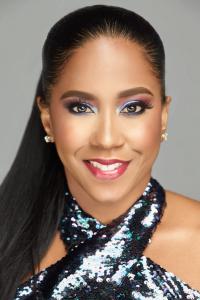Mahisha Dellinger and Dr Karen Morley Interviewed by Candice Georgiadis
Mahisha Dellinger, founder and CEO of CURLS Beauty Brands. Dr Karen Morley, author of Beat Gender Bias, Lead like a Coach and Gender-Balanced Leadership
Some hot topics discussed in the below interviews by Candice Georgiadis. Growing marketing reach tied in with brand and image building makes for a powerhouse result. Now that the reopenings are happening, it is time to ramp up marketing and beat out your competitors. Reach out for Candice Georgiadis at the below contact options to get started right away.
-
Mahisha Dellinger, founder and CEO of CURLS Beauty Brands
Can you share one of the major challenges you encountered when you first started your company? What lesson did you learn from that?
As a young, African American woman, getting a small business loan was next to impossible, despite having exceptional personal credit. I decided to fund the business from my personal savings account, so we launched on a much smaller scale. In hindsight, I realize this was a better path for the brand. I took every penny earned from CURLS and reinvested it back into the company. The company grew, organically over time, which was best for the company.
What are some of the factors that you believe led to your eventual success?
Hands down, I know, without a doubt that my GRIT, DETERMINATION and PERSEVERANCE led to my success. I have a pretty strong will to get it down. My motto was “not if, BUT when!”
What are your “5 Things I Wish Someone Told Me Before I Became CEO”? Please share a story or example for each.
Your self esteem will take a beating, a few times.
Like Flight Attendants suggest, take care of you, FIRST!
Mental health is almost more important than physical health, to survive this journey
Never, EVER get comfortable in your success.
Your first hire will be your most important hire. Choose wisely
What advice would you give to your colleagues to help them to thrive and not “burn out”?
In the grand scheme of trying to have it all, we often put ourselves on the back burner. It is crucial that you take care of you. How can you work out when you don’t have enough time with your kids? How can you take a bubble bath when you need to make a presentation? Realize now that there will never be enough time in the day to get everything done. Your in-box will still be there. Make the “main thing(s)” the MAIN thing(s)…for me it is God first, Family second, business third. Full interview is available here.
-
Dr Karen Morley, author of Beat Gender Bias, Lead like a Coach and Gender-Balanced Leadership
Even in 2019, women still earn about 80 cents for every dollar a man makes. Can you explain three of the main factors that are causing the wage gap?
The overarching factor is that traditionally, we expect women to be warm, kind, gentle, and understanding while we expect men to be tough, competitive, assertive and competent. We associate women with nurturing, support and lower status roles while we associate men with power, authority and higher status. We like women and respect men. While these are traditional views, and some of us don’t like them much, they persist. They’re sticky stereotypes.
We don’t have to agree with these gender-based expectations for them to affect our decisions. Nobel prizewinning psychologist Daniel Kahneman has alerted us to the fact that our brains work on two very different levels, ‘fast’ and ‘slow’. While we believe that we know what we are thinking, we often don’t. Most of our ‘mental work’ occurs in the fast lane of intuitions and impressions. Most decisions are made without awareness.
A hefty part of the gender bias problem is that it’s not always possible to know when you’ve made a decision, let alone whether it was fair or biased. That’s a big problem when we’re working out what to pay people.
It’s one thing to make decisions and not know it. It’s even worse to make decisions you don’t know you’re making and not agree with them. See my pilot story above.
Bias hinders women’s progress in organizations in these key ways:
1. You can’t be what you can’t see. Affinity bias means that we like people who are just like us and are more influenced by people who are similar rather than different. This can have a significant impact on career choices. If I can see ‘people like me’ in a particular career or job role, I’ll choose that path. If I can’t, I won’t.
What that means is that there are fewer women in senior, decision-making roles — that’s where pay decisions get made. It also means that homogeneous groups of people generally make poorer decisions — they deliberate less, they ‘think they know’, they don’t question or challenge their thinking. With little diversity and no particular attention paid to bias, it’s not surprising that women get less pay than men.
2. You’re damned if you do and doomed if you don’t. Women’s progress is limited by expectancy bias. Women are commonly ‘demoted’ to roles that are in keeping with traditional expectations. Female doctors are often mistaken for nurses, female lawyers for paralegals. We do not expect women to hold senior roles, despite the fact that, increasingly, they do.
Women, even very senior ones, are still expected to do the ‘office housework’. When a man offers to help with these tasks, we praise him for his contribution. His help is less expected and more visible. If a woman declines to help, she faces backlash; she’s selfish. When a man says no, there’s no similar backlash; he’s busy. The time that women spend helping others penalizes them by taking them away from progressing their own careers.
Men then, are more likely to get the more visible roles, the high-profile projects and line and operational management roles. Being more visible, it’s easier to believe they work harder and achieve more. Ergo, higher pay.
What you see is not what you get.
This plays out in pay through two biases; confirmation and certainty. Read the rest of this important interview here.
Be sure to reach out to Candice Georgiadis to get your social media marketing on the right track. You can reach her at the below contact options.
About Candice Georgiadis
Candice Georgiadis is an active mother of three as well as a designer, founder, social media expert, and philanthropist. Candice Georgiadis is the founder and designer at CG & CO. She is also the Founder of the Social Media and Marketing Agency: Digital Agency. Candice Georgiadis is a Social Media influencer and contributing writer to ThriveGlobal, Authority Magazine, and several others. In addition to her busy work life, Candice is a volunteer and donor to St Jude’s Children’s hospital.
Contact and information on how to follow Candice Georgiadis' latest interviews:
Website: http://candicegeorgiadis.com/
Email: CG@candicegeorgiadis.com
LinkedIn: https://www.linkedin.com/in/candice-georgiadis-34375b51/
Twitter: https://twitter.com/candigeorgiadis @candigeorgiadis
Candice georgiadis
candicegeorgiadis.com
+1 203-958-1234
email us here
Visit us on social media:
Twitter
LinkedIn
Legal Disclaimer:
EIN Presswire provides this news content "as is" without warranty of any kind. We do not accept any responsibility or liability for the accuracy, content, images, videos, licenses, completeness, legality, or reliability of the information contained in this article. If you have any complaints or copyright issues related to this article, kindly contact the author above.



